- Home
- Lisa Kleypas
Only With Your Love Page 19
Only With Your Love Read online
Page 19
“You…you…” she stuttered, wondering if she had heard him correctly.
“My mother was a heartless bitch who cared only for her own pleasure. She shamed my father by having affairs with other men. She had no maternal instincts whatsoever. Philippe and I were nothing to her but an inconvenience. After she died, my father could not look at either of us without being reminded of her.” His eyes met Celia’s. “To everyone else Philippe and I were objects of curiosity, suspicion, sometimes pity. Other boys would dare us to fight for our honor. While I was always ready to oblige, Philippe tried to play the peacemaker.” He laughed quietly. “Although I’d provoke him at times, Philippe always came to my defense, even sharing the punishment for my misdeeds. And I protected him when I could. He was a dreamer, a sentimental idiot. I couldn’t begin to understand where he got his damn naive innocence. He was…remarkable. He was all I had. Love him? God, yes, I—” He swallowed hard and tightened his fingers.
“Justin,” she whispered. “What are you holding?”
He didn’t seem to hear her.
Taking hold of his fist, she pried it open finger by finger. In his palm was a brown arrowhead. His hand lay open, unresisting as she picked up the small object. She recognized it from the box that had been on Philippe’s dresser. Her eyes widened in concern as she saw the smear of blood on Justin’s palm. The point of the arrowhead had pierced the tough skin.
“Justin,” she gasped, and without thinking she pressed her lips to the welling drop of blood.
He sucked in his breath as he felt her soft mouth buried in his palm. Her blond head was bent over his hand, the tip of her tongue touching the puncture wound and collecting the salt-flavored droplet.
Celia froze as she realized what she was doing. She took her lips from his skin and stared at the large hand cradled in hers. Shocked by her own actions, she continued to kneel at his feet. Justin was still, and so was she, but she heard how his breathing had quickened. She wanted to look at his face, but she was terrified. What was happening to her? She wanted to pull that strong, warm hand to her throat and down to her breast. She wanted to crawl further into the lee of his thighs and feel his mouth on hers. Somehow the specter of Philippe’s death had just been removed from between them, and she was afraid of Justin in a way she had never been before.
She raised her head jerkily and stared into his eyes. The dark blue depths contained a bewilderment that matched, perhaps even surpassed, her own. Celia was helpless to move or speak. Her face felt hot, and her heart thumped painfully in her chest. She knew that her stillness and silence was an invitation. Gradually his hand turned until both of hers were imprisoned. They stayed like that for what seemed to be minutes, hours, frozen in a timeless place where his awareness and hers grew in leaping surges.
They broke apart quickly, Celia springing to her feet with an incoherent excuse about looking for the children. “The girls…I must find them,” she said hoarsely.
“Celia—”
But she was gone before he could say anything else. Justin stared at the empty doorway, then dropped his head and cursed viciously. He had to leave. His instincts told him that a silken net was closing around him. If he didn’t escape soon, he would be entangled forever in its soft, tenacious bonds. But he couldn’t leave—he didn’t yet have the strength or the resources to evade Dominic Legare. This fragile masquerade was his only protection. The only question was, which threat was greater? The one posed by Dominic Legare…or the one posed by his own brother’s wife.
Bored and restless, he could not resist seeking Celia out in the afternoon, wandering to the garçconnière where she disappeared for an hour or two every day. He was irritated with the limitations his wounds placed on him, his usually free stride reduced to a pained hobble, his side and shoulder aching. The plantation was quiet as everyone attended to his own tasks and took little notice of him. Impatiently he knocked on the small front door and scowled at the housemaid who answered it. “Where is Madame Vallerand?” he asked. The girl eyed him uneasily before running to tell Celia of the visitor.
Celia appeared, clad in a simple blue dress and a full-length white apron. Her hair had been gathered with a ribbon and left to fall down her back. She lifted her tawny brows. “What is it?” she asked without preamble. “Ça va?”
“Yes, I’m all right.” Justin experienced the same mystifying reaction he always had when she was near, feeling soothed and comfortable. “What is the apron for?”
Celia hesitated before answering. “I am painting.”
He looked at her in mild surprise. “I didn’t know you painted. Let me in. I want to see your work.”
“No,” she said firmly. “No one sees it. It is not very good. I paint only for myself.”
His interest piqued, he set about to cajole her. “I wouldn’t criticize.”
“Even if you did, your opinion means nothing to me.”
“Then let me come in.”
“No, I will not have you ruin my privacy merely because you have need of entertainment!”
“Then you won’t let me in?”
She tried to stare him down, but a reluctant laugh escaped her. The flash of smiling beauty caused a strange constriction in Justin’s chest. “All right,” she said gruffly, and turned to walk down the small hallway that led to the room where she worked. Justin was at her heels immediately, the thump of his cane muffled by the carpet on the floor.
As they crossed the threshold of her studio, Celia was aware of a pang of nervousness. She wondered half-angrily what had prompted her to give him, of all people, the opportunity to ridicule her. Adopting a businesslike air, she went to the easel by the window and regarded the almost-finished watercolor with her arms folded. Justin followed and stopped behind her, leaning his weight on his good leg. He stared at the painting closely.
She had painted the bayou in dark greens, grays, and blues, capturing the shadows and thick trailing moss, the ancient trees with their limbs like outstretched arms. It looked gloomy and threatening; her fear of the place was evident in every brushstroke. Contemplating the picture, he said the first thing that came into his mind. “It’s not always that sinister.”
“It is to me.”
“Sometimes it can be beautiful.” Then he went off on his own, investigating the sketches scattered around the room and the canvases piled carelessly on top of one another. Her work was delicate and deft. Even in her more amateurish efforts her feelings showed through. He smiled at the sketch of a bored driver and footman leaning against a carriage as they waited outside the house. And there was a painting of Maximilien on a horse as he surveyed the plantation—Justin recognized the proud tilt of his father’s head and the upright line of his back. Glancing at Celia over his shoulder, he smiled, and she seemed to relax. Perhaps his liking for her work wasn’t based solely on its own merits. Perhaps it was influenced by his feelings for her. But he didn’t give a damn why he liked it, he only knew that he did.
He came across a sketch that caused him to stare intently. It was of Lysette nursing her baby, her slender arms cradling his small body, her long curls falling in a curtain around the head at her breast. The scene was disarming in its intimacy and tenderness, a glimpse into the private feminine world men were seldom permitted to see.
“Please…you must put that away,” Celia said in a low voice. Her cheeks were flushed. “It would embarrass her if she knew you had seen it.”
Obligingly he set it aside and walked to her. “Have you done any of Philippe?” The question seemed to bring a brighter flush to her face.
Celia was still, her velvety brown eyes raised to his. For once Justin could not read her thoughts. Seeming to make a decision, she turned and went to a nearby table, leafing through a book of sketches. She brought one back to him, the parchment trembling a little. He took it from her, anticipating the ache of recognition as he saw his brother’s face. But his eyes widened in surprise. The sketch was not what he had expected. The portrait was of a man with a derisive
smile on his lips, an insolent expression lurking in his gaze, and features just a little too lean to be Philippe’s.
“It’s me,” Justin said. He threw her a questioning glance.
“Yes,” she said softly. “It seems to happen whenever I try to draw Philippe. It is never just right. The more I work on it the more it resembles you.”
They spoke in hushed tones, as if they were in danger of being overheard.
“Why?” he asked.
“I…don’t know.”
“When was this done?”
“A few days ago. I was thinking of him.”
“And of me.”
“Yes,” she whispered.
He was silent, staring at her, feeling his heart beat heavily, feeling himself being dragged toward a discovery he did not want to make.
“Perhaps you should leave,” Celia said with an effort, taking the sketch from him. “Lysette will be here soon. An Irish girl is bringing over gowns from the dressmaker. We thought it would be convenient to have the last fittings done here.”
Celia was both relieved and affronted as Justin left almost immediately. She busied herself with straightening her supplies, and gradually the inner turmoil caused by his visit subsided. Lysette swept into the garçconnière with a cheerful smile, followed by the Irish girl, Briony, and footmen burdened with towering stacks of boxes and supplies.
“You must tell Monsieur Deneux that we are very pleased with the gowns,” Lysette said as Briony finished the last alterations for a lovely sea-green silk, high-waisted and cut very low across the bosom. The color was entrancing against her white skin and red hair, and Lysette took an obvious guilty pleasure in the new gown. “How wonderful it is to be out of mourning.”
“’Tis wonderful that Mr. Valleyrand is back home,” Briony replied in a subdued voice.
Celia watched the seamstress adjust one of the short, full sleeves of the gown. They had ordered several ensembles from the dressmaker for both Celia and Lysette, beautiful gowns in rose, blue, green, and lavender. Privately Celia thought that she had never seen the Irish girl in such a distraught mood. Briony was usually cheerful and animated, her brown curls dancing, her small form never at rest. But now she looked pale, and her green eyes were feverishly bright in her white face. Had Briony and Lysette been involved in some kind of dispute? There was an obvious tension between the two in spite of their efforts to behave as usual.
“Well now, that’s the last o’ them,” Briony said, unfastening the back of Lysette’s gown. “I’ll take them back to the shop an’ we’ll have them done by Thursday.”
“Thank you.” Lysette stepped out of the gown and handed it to her. “I will finish dressing here. Go to the main house and tell them to have the carriage brought around.”
Celia stared at the Irish girl, then glanced at Lysette. “She seems rather troubled about something, n’est-ce pas?”
Lysette shrugged a little too nonchalantly. “Ah, girls that age have such changeable moods. Celia, will you tell Noeline to have the maids take the gowns to the carriage? I believe she is in the kitchen with Berté.”
“Certainly.” Celia took the path from the garçonnière to the main house, enjoying the cool breeze that stirred the leaves and brought with it the scent of lemon trees. Dusk had settled over the plantation, the horizon tinged with the last traces of red from the sunset. She paused as she saw Briony disappear behind the hedge of the garden. Perplexed, she followed the girl, wondering why she had not gone directly to the main house.
Justin sat in the garden on the stone bench by the fountain. The rustle of light feet walking across the grass caught his attention, and he looked toward the sound. It was a girl he had never seen before, a pretty Irish girl with freckles and curly brown hair. Her small figure was clad in a modest blue gown of worsted fabric, and a long white apron. Bits of thread clung to her sleeves and bodice. She must have brought Celia’s gowns from the dressmaker.
Justin’s eyes narrowed inquiringly as she approached him. She was staring at him oddly, her eyes huge, her face stark white. With alarm he saw that tears were ready to fall down her softly rounded cheeks. Bon Dieu, he hated to be confronted with crying females! Why the hell was she crying, and why was she looking at him as if—
“Philippe,” she whispered, sitting on the bench beside him. Her small work-roughened hands came to his face, touching him tenderly. “Oh, Philippe, me love, when I heard ye weren’t dead…”
Before Justin could say a word, she pressed her mouth to his in a sweet, searching kiss.
Chapter 9
Astonished, Justin tried to take stock of the situation. Obviously the girl was a former lover of Philippe’s. But Philippe had not been the kind to trifle with servants. He had not even taken a quadroon mistress when he’d come of age. Philippe had always been attracted to girls of frail gentility, not robust wenches such as this.
While one part of his mind speculated on how closely Philippe and this girl had been acquainted, the other part noted how surprising it was that she moved him so little. Usually he would have taken great pleasure in the advances of a comely wench, and immediately have begun to teach her a few things she didn’t seem to know about kissing. But although her lips were soft and sweet, he took as little satisfaction from the kiss as if he were starving and had been offered merely a cup of weak tea. And it wasn’t the girl’s fault, it was his. There was only one woman he wanted.
“Puir darlin’,” she said in a low, passionate voice, feeling the bandages through his shirt. “When they told me ye were dead part o’ me died too. I know there’s nothin’ I can have o’ ye now. Yer wife is a good woman. I wouldna seek to take ye from her. But I can still love ye, Philippe, an’ I will fer the rest o’ me life. I just wanted one moment fer meself, one last kiss. In me heart ye’ll always be mine. I’ll nivver give meself to another man. I’ll wait forever, even if ye nivver want any part o’ me. Whatever ye care to take I’ll give gladly. ’Tis a sin to love another woman’s husband, but I don’t care. I canna tear me very heart out by denyin’ what I feel.” She kissed him again, but this time she sensed that something was wrong, and she pulled her head back to look at him. “Philippe? What is it?”
Her tear-streaked face went blank, and her trembling fingers touched his lips, chin, and cheek, exploring gently. Then her hand fell away. “Ye’re not Philippe,” she gasped. She swayed, and he took her by the shoulders. She regarded him with wide eyes. “Ye’re the brother. Justin.”
Justin was quiet, knowing there was no denial, no lie that would make her believe he was his brother.
Her throat worked as she tried to speak. She stared into his midnight-blue eyes and found her voice. “Philippe talked of ye often.”
“He did?” Justin questioned in surprise. He’d thought that Philippe had not spoken about him with anyone, not even Celia.
The girl’s shoulders quivered in his hands. “Where is Philippe?” she asked, her voice breaking. “He’s…dead, isn’t he?” Justin nodded slightly. She gave a grief-stricken moan and bit her lip.
“What is your name?” Justin asked bluntly, and she choked back her sobs.
“Briony. Miss Briony Doyle.”
“Miss Doyle,” he repeated. “Are you going to keep my secret?”
“Wh-why have ye taken his place?”
“There are men who seek to take my life. The same ones who killed Philippe. I can’t force you to hold your silence. All I can do is trust that you will do it out of respect for Philippe. I think he would have asked you to help me.”
Briony nodded slowly. “I’ll help ye.”
“Thank you,” Justin said, wondering if she could be trusted.
“Philippe loved ye,” she said softly. “He worried over ye every day of his life. I’ll keep yer secret, Mr. Valleyrand—if ye’ll keep mine.”
“Aye.” Justin let go of her, and she continued to sit there, her shoulders slumped. He pitied her, seeing that although she was just a girl, her grief was as deep as Celia’s had bee
n. Perhaps even deeper, for he knew without asking that Briony and Philippe had been lovers, and that Philippe had been the center of this girl’s life.
“I lost him when he left fer France to marry Celia Verité,” Briony confessed, her voice hollow. “I knew he loved me. I made him happy, but I’d nivver be worthy of him. He dreamed of marryin’ a fine lady wi’ soft hands, one who understood the poems an’ such he liked. I nivver asked him fer anythin’…I knew he would leave me someday. I gave him all o’ meself an’ didna try to hold him to me. A Valleyrand an’ an Irish lass.” She shook her head with a wavering smile. “’Twas a daft notion.”
“Philippe was a fool,” Justin said gently. “I think you must have been good for him.”
Justin would have liked to have seen his brother with this impulsive girl, someone who would have jolted him from his dreams and his safe inner world. Someone who had loved him enough to follow her heart instead of conventions. Celia had loved Philippe, but she never would have challenged him.
“Puir Madame Valleyrand,” Briony murmured as if following his thoughts.
“Don’t worry about her. She’s a strong woman,” Justin said, and gestured for her to go to the house. “It’s best that you leave before you’re seen.” He paused. “You won’t tell anyone who I am?”
“No,” she said. “I wouldna betray Philippe’s brother.” Stiffening her spine, she stood and walked away, rubbing her eyes with her sleeve.
Justin watched her thoughtfully, pondering the discovery that Philippe had been in love with two women, suffered doubt and indecision, and taken a girl’s innocence because he had wanted her too much to heed the warnings of his conscience. My God, he thought, we may have had more in common than I thought, mon frère.
He felt a tingling on the back of his neck and turned to find Celia standing close by. She was glaring at him. Even in the gathering darkness he could see that she was flushed.

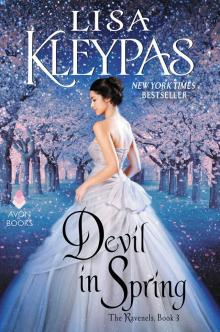 Devil in Spring
Devil in Spring Sugar Daddy
Sugar Daddy Devil in Winter
Devil in Winter Dreaming of You
Dreaming of You Christmas Eve at Friday Harbor
Christmas Eve at Friday Harbor Love, Come to Me
Love, Come to Me Only With Your Love
Only With Your Love Suddenly You
Suddenly You Secrets of a Summer Night
Secrets of a Summer Night Cold-Hearted Rake
Cold-Hearted Rake Where's My Hero?
Where's My Hero? Gifts of Love
Gifts of Love Married by Morning
Married by Morning Then Came You
Then Came You Wish List
Wish List Where Dreams Begin
Where Dreams Begin A Historical Christmas Present
A Historical Christmas Present Somewhere I'll Find You
Somewhere I'll Find You Scandal in Spring
Scandal in Spring Someone to Watch Over Me
Someone to Watch Over Me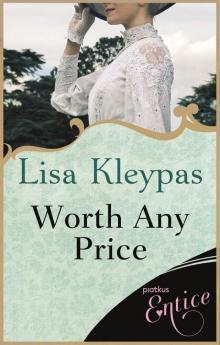 Worth Any Price
Worth Any Price Prince of Dreams
Prince of Dreams It Happened One Autumn
It Happened One Autumn Love in the Afternoon
Love in the Afternoon Devil's Daughter
Devil's Daughter A Wallflower Christmas
A Wallflower Christmas Tempt Me at Twilight
Tempt Me at Twilight Brown-Eyed Girl
Brown-Eyed Girl Mine Till Midnight
Mine Till Midnight Again the Magic
Again the Magic Lady Sophia's Lover
Lady Sophia's Lover Because You're Mine
Because You're Mine Midnight Angel
Midnight Angel Smooth-Talking Stranger
Smooth-Talking Stranger Blue-Eyed Devil
Blue-Eyed Devil Hello Stranger
Hello Stranger Dream Lake
Dream Lake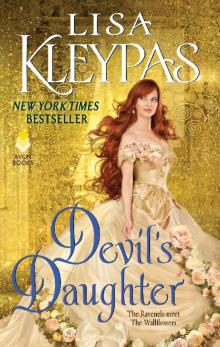 Devil's Daughter: The Ravenels Meet the Wallflowers
Devil's Daughter: The Ravenels Meet the Wallflowers A Christmas to Remember
A Christmas to Remember Smooth Talking Stranger
Smooth Talking Stranger Crystal Cove
Crystal Cove Marrying Winterborne
Marrying Winterborne Stranger in My Arms
Stranger in My Arms Devil in Disguise
Devil in Disguise Worth Any Price bsr-3
Worth Any Price bsr-3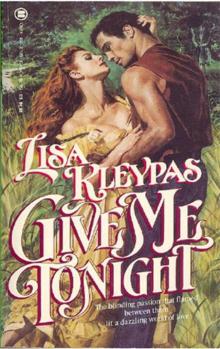 Give Me Tonight
Give Me Tonight Rainshadow Road fh-2
Rainshadow Road fh-2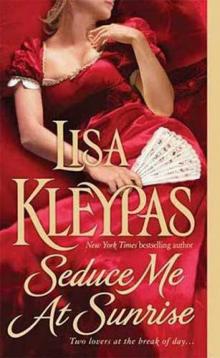 Seduce Me At Sunrise
Seduce Me At Sunrise I Will
I Will Someone to Watch Over Me bsr-1
Someone to Watch Over Me bsr-1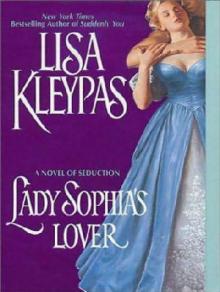 Lady Sophias Lover bsr-2
Lady Sophias Lover bsr-2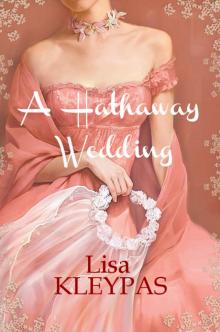 A Hathaway Wedding
A Hathaway Wedding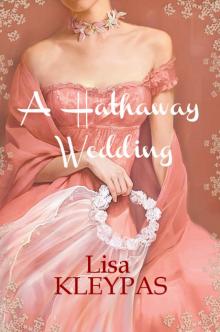 A Hathaway Wedding (Hathaways Bk2.5)
A Hathaway Wedding (Hathaways Bk2.5) Worth Any Price - Bow Street 3
Worth Any Price - Bow Street 3 Christmas with Holly
Christmas with Holly